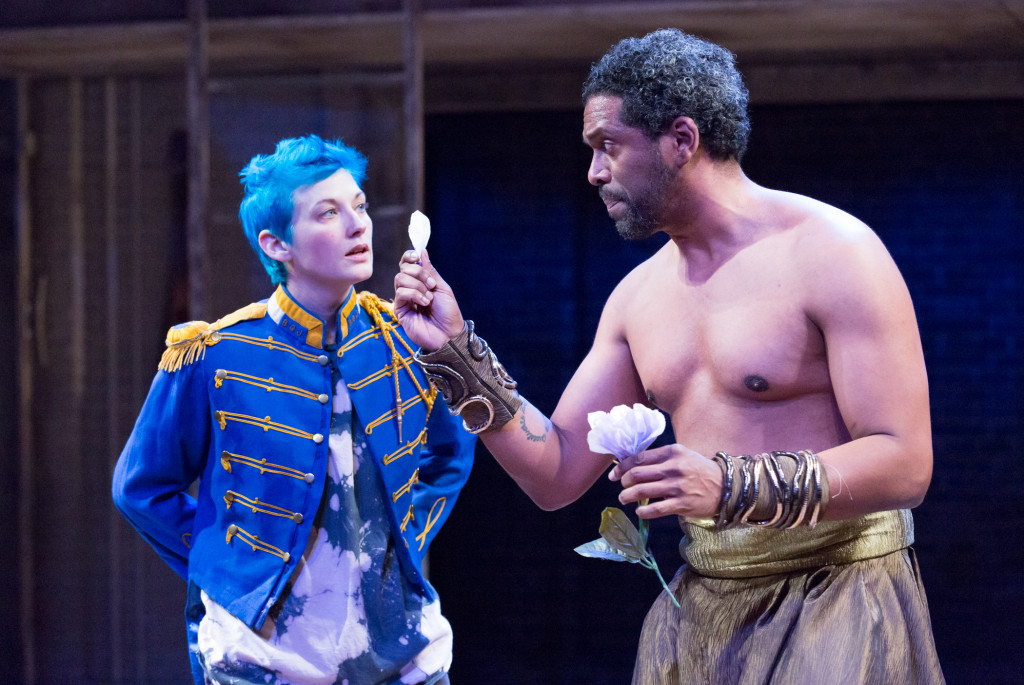
I have a few requisites for a successful Shakespeare production: 1. Convey the beauty of his language; 2. communicate the insight in his vibrant characterizations; and 3. capture the dramatic accessibility of his plots. Those seem like fairly humble hopes for adapters of our language’s greatest poet and playwright, but I’m usually disappointed on one or all of these.
So thank humanity for directors like Matt Pfeiffer and shows like Arden Theatre Company’s A MIDSUMMER NIGHT’S DREAM. Pfeiffer presents understandable dialog from clearly delineated characters in an easy-to-follow plot. He makes Shakespeare simple, and simply fun.
The simplicity runs from Olivera Gajic’s contemporary (but not editorialized time-period “modern”) costumes to Paige Hathaway’s barely adorned thrust set, featuring two large lovely moons. Thom Weaver’s lighting is impressive while unobtrusive. Only Alex Bechtel’s sound design and original music makes any ambition to shape the story; something he does by having characters sing scene-setting songs by the Kinks (“Strangers”), Emmylou Harris (“If I Needed You”), Bonnie Raitt (“I Can’t Make You Love Me”), and others.
Although the surfeit of strong characters can muddle weaker productions, the plot itself is fairly straightforward: a love-rectangle of Athenian couples see their affections altered by the magical beings of a nearby forest. Sean Close (as Lysander) and Brandon J. Pierce (as Demetrius) entertain as competing males, but Taysha Marie Canales (as Hermia: “Though she be but little, she is fierce”) and the utterly charming Rachel Camp (as Hermia) overpower the stage as the rotating victims of affection. By clearly establishing the characters and their plotline, Pfeiffer is able to highlight Shakespeare’s insight: these women suffer whether in or out of favor.
The romantic shifts are orchestrated by lord of the fairies Oberon (played with an appealing faint absurdity by Lindsay Smalling) and wood sprite Puck (a fittingly spritely Mary Tuomanen). They also have their fun with fairy queen Titania (Katharine Powell) and actor Bottom (Dan Hodge).
With an hilariously self-aware physical performance, Hodge leads a troupe of players in Shakespeare’s knowing comic subplot about thespian self-seriousness and ineptitude. Here Canales, Camp, Close, and Pierce shine again in alternate characters, with Doug Hara as their hapless director Peter Quince.
Once more, each character is given vivid life—Canales’s blank inanity as a brick wall and Pierce’s drolly laconic tailor prove highlights—though the drawn out interlude towards the play’s end makes for a strangely anticlimactic pacing. Some of this interruption is true to Shakespeare’s text as we’ve inherited it; but some is directorial indulgence in a seriously funny scene which probably proved difficult to trim in isolated rehearsal.
This quibble is one of few with a thoroughly entertaining production. (Powell’s faux-Russian reading of Queen Hippolyta also distracts.) It’s accessible without being dumbed down. Shakespeare’s poetry rolls naturally, his characters are alive, his comedy true. Done right, he’s pretty good.
